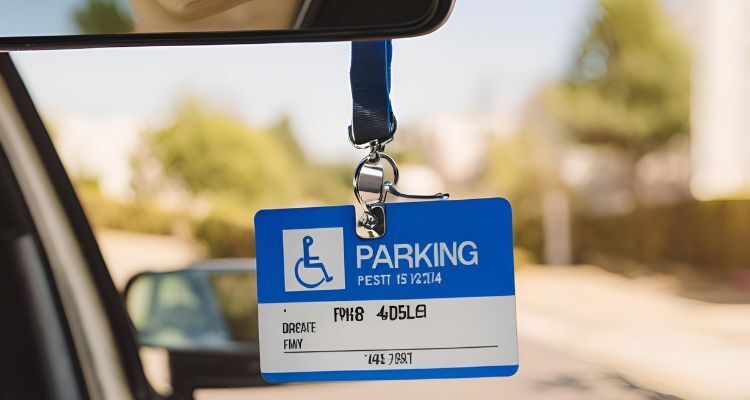
Can Pregnant Women Use Disabled Parking Permits Issued to Others?
Introduction
Pregnancy is a unique and transformative time in a woman's life, bringing about a multitude of physical and emotional changes. As the maternal phase progresses, the physical demands on a woman's body can lead to mobility challenges, fatigue, and discomfort. In some cases, these challenges may make it difficult for pregnant women to carry out daily activities, including walking long distances from parking lots to destinations. Disability passes, which provide access to reserved parking spaces closer to building entrances, can be a valuable resource for those experiencing mobility impairments. However, a common question arises: Can pregnant women legally and ethically use disability passes issued to others, such as a family member or friend, to ease their parking challenges?
This article aims to clarify the legality and ethics of using another person's disability pass during gestation. We will explore the rules and regulations governing the use of disability passes, the potential consequences of misuse, and the ethical considerations involved. Additionally, we will discuss the options available for expecting mothers who may need temporary parking accommodations due to pregnancy-related mobility challenges.
Understanding Disabled Parking Permits
What Is a Disabled Parking Permit?
A disabled parking permit, also known as a handicap placard or disabled person parking placard, is a special pass issued by state authorities that allows individuals with mobility impairments to park in designated accessible parking spaces. These spaces are typically located closer to building entrances and are wider than standard parking spaces, providing additional room for maneuvering and exiting vehicles.
Types of Handicap Parking Permits
Handicap tags come in various forms, each serving a specific purpose based on the nature and duration of the mobility impairment:
Permanent Tags: Issued to individuals with long-term or permanent disabilities that significantly impair their mobility. These tags are typically valid for several years and may require periodic renewal.
Temporary Tags: Issued to individuals with temporary mobility impairments, such as those recovering from surgery or experiencing short-term medical conditions. Temporary tags are usually valid for a limited period, ranging from a few weeks to several months.
Placards: Portable tags that can be displayed in any vehicle in which the authorized holder is traveling. Placards are particularly useful for individuals who may use different vehicles.
License Plates: Issued to vehicle owners who have a disability, these plates are affixed permanently to the vehicle and serve the same purpose as placards.
Eligibility for Disabled Parking Permits
To obtain a disability pass, an individual must meet specific eligibility criteria, which vary by state. Generally, eligibility is based on having a medical condition that significantly impairs mobility. Conditions that may qualify for a special pass include:
- Inability to walk 200 feet without stopping to rest
- Severe mobility impairments requiring the use of assistive devices
- Lung disease or respiratory conditions affecting mobility
- Cardiovascular conditions limiting physical activity
- Arthritis, neurological, or orthopedic conditions affecting mobility
- Temporary conditions, such as recovery from surgery or pregnancy complications
To apply for a tag, the individual must obtain medical certification from a licensed healthcare provider, confirming that they meet the eligibility criteria. This certification is then submitted to the relevant state agency, typically the Department of Motor Vehicles (DMV), which issues the tag upon approval.
Rules and Regulations Governing Handicap Passes
Disability passes are issued with specific rules and regulations governing their use. These rules are designed to ensure that the tags are used by those who genuinely need them and that accessible parking spaces are available for those individuals. Some key regulations include:
Authorized Holder Must Be Present: The person to whom the pass is issued must be present in the vehicle when the pass is used. It is illegal to use a disability pass if the authorized holder is not in the vehicle.
Display of the Pass: The disability pass must be prominently displayed in the vehicle, usually hanging from the rearview mirror, while the vehicle is parked in a designated accessible parking space.
Misuse and Penalties: Misuse of a disability pass, such as using someone else's tag without the authorized holder being present, is illegal and can result in fines, penalties, and the revocation of the tag.
The Legality of Using Someone Else’s Handicap Parking Permit
Legal Framework
The legal framework surrounding the use of disability passes is strict and clear: only the individual to whom the tag is issued (the authorized holder) is legally allowed to use the tag. This means that if a disability pass is issued to a specific person, that person must be in the vehicle at the time the tag is used to park in a designated accessible parking space. The tag cannot be used by anyone else, even if they are experiencing temporary mobility challenges, such as those related to the maternal journey.
Key Legal Points:
Authorized Holder Presence: The pass holder must be physically present in the vehicle when the tag is used. It is illegal to use a tag issued to someone else if the authorized holder is not present.
Misuse Penalties: Using someone else's disability tag without the authorized holder being present is considered misuse. Penalties for misuse can include fines, legal action, and the revocation of the pass.
State-Specific Regulations: While the general rules regarding disability tag use are consistent across states, there may be state-specific regulations that further clarify the conditions under which passes can be used. It is important to be aware of the laws in your specific state.
Legal Consequences of Misusing a Disabled Parking Permit
Misusing a handicap tag by using one issued to another person without the authorized holder being present can have serious legal consequences. These consequences vary by state but generally include:
Fines: Individuals caught misusing a handicap tag may be subject to fines. These fines can range from $100 to $1,000 or more, depending on the state and the severity of the violation.
Revocation of the Permit: The state may revoke the accessible tag if it is found to be misused. This can be particularly problematic for the authorized holder, as they may lose access to accessible parking spaces.
Legal Action: In some cases, misuse of an accessible tag can result in legal action, including misdemeanor charges. This can lead to a criminal record, which may have long-term consequences.
Towing and Impoundment: Vehicles parked in accessible parking spaces without a valid pass or using a pass that is not legally valid may be towed and impounded. The vehicle owner would then be responsible for towing and impoundment fees.
Legal Exceptions
There are very few legal exceptions to the rule prohibiting the use of someone else's handicap tag. One possible exception might be if the authorized holder is present in the vehicle and requires assistance. However, even in these cases, the pass should only be used to park in an accessible space if it directly benefits the authorized holder, not other passengers.
Ethical Considerations
While the legal consequences of misusing a disability pass are significant, it is also important to consider the ethical implications. Accessible parking spaces are a vital resource for individuals with mobility impairments, providing them with the access they need to carry out daily activities. Using someone else's accessible tag, even if motivated by temporary mobility challenges, such as those related to pregnancy, can deprive someone with a genuine need of access to these spaces.
The Ethical Implications of Using Someone Else’s Disability Tag
Beyond the legal ramifications, using someone else's accessible tag raises significant ethical concerns. Accessible parking spaces are limited, and they are intended for those who genuinely need them. When someone who is not disabled uses a pass, they are taking a space away from someone who may have a critical need for it.
The Impact on the Disabled Community
The misuse of disability passes can have a broader impact on the disabled community. It can lead to increased scrutiny and skepticism of those who legitimately use accessible parking spaces, potentially resulting in unwarranted confrontations or stigma. Additionally, the misuse of passes can contribute to a scarcity of accessible parking spaces, further marginalizing individuals with disabilities.
Respect for the Intended Purpose of Disability Tags
It is essential to respect the intended purpose of disability passes and to recognize that they are a critical tool for ensuring accessibility and independence for individuals with disabilities. The ethical use of these passes involves adhering to the rules and recognizing that their misuse undermines the rights of those who truly need them.
Ethical Points to Consider:
Respect for Others' Needs: Accessible parking spaces are limited and should be reserved for those who genuinely need them. Using someone else's tag can prevent a person with a disability from accessing a space they need.
Honesty and Integrity: Using a disability pass issued to another person without their presence is dishonest and undermines the integrity of the system designed to support individuals with disabilities.
Empathy and Understanding: While expecting a child can be physically challenging, it is important to empathize with those who live with permanent disabilities and rely on accessible parking spaces for their daily mobility.
Options for Pregnant Women Needing Parking Accommodations
Temporary Handicap Passes for Pregnant Women
Pregnancy, especially in the later stages, can lead to mobility challenges that make walking long distances difficult or uncomfortable. In some cases, pregnant women may qualify for a temporary parking tag based on their medical condition. These tags are issued for a limited period and are intended to provide support during times of temporary mobility impairment.
Eligibility for Temporary Tags During Pregnancy
Eligibility for a temporary parking tag during your motherhood journey varies by state, but some common criteria include:
Pregnancy-Related Complications: Conditions such as severe pelvic pain, sciatica, or other gestation-related complications that significantly impair mobility may qualify a pregnant woman for a temporary pass. Being an expecting mother can cause various physical challenges, particularly in the later stages. These may include:
- Back Pain: The additional weight of the baby, coupled with changes in posture, can lead to significant back pain.
- Swelling: Swelling of the feet and ankles, known as edema, is common during the maternal phase and can make walking painful.
- Shortness of Breath: The growing uterus can press against the diaphragm, making it difficult for pregnant women to breathe, particularly when walking or climbing stairs.
- Fatigue: Pregnancy often brings about extreme fatigue, making it difficult for women to walk long distances without rest.
Medical Certification: To obtain a temporary pass, a pregnant woman must provide medical certification from her healthcare provider, confirming that her mobility is significantly impaired due to pregnancy-related complications.
Limited Duration: Temporary parking tags issued during the motherhood journey are typically valid for a few months, covering the duration of the maternal phase and the immediate postpartum period if needed.
Applying for a Temporary Disabled Parking Permit While Expecting
In many jurisdictions, expectant mothers who experience significant mobility issues may qualify for a temporary parking tag. The steps to obtain a disabled parking permit whil pregnant are:
Consult with Your Healthcare Provider: If you are experiencing mobility challenges due to pregnancy, discuss your condition with your healthcare provider. They can assess your needs and determine whether you qualify for a temporary pass.
Obtain Medical Certification: If your healthcare provider determines that you qualify, they will provide you with a medical certification form that details your condition and the expected duration of your mobility impairment.
Complete the Application: Obtain the appropriate application form from your state's Department of Motor Vehicles (DMV) or equivalent agency. Complete the form and attach the medical certification.
Submit the Application: Submit the completed application and medical certification to the DMV, either in person, by mail, or online, depending on your state's requirements.
Receive and Use the Permit: Once your application is approved, you will receive your temporary disability tag by mail. You can begin using it immediately, ensuring that you have access to accessible parking spaces during your pregnancy.
Limitations of Temporary Passes
Temporary handicap passes issued to pregnant women are generally time-limited and intended to address specific pregnancy-related mobility issues. These tags are not intended for use by individuals who do not meet the qualifying criteria, such as friends or family members of the pregnant woman.
Alternatives to Disability Passes for Pregnant Women
If you do not qualify for a temporary pass during pregnancy, there are still alternatives to help manage parking challenges:
1. Seeking Assistance from Family or Friends
If a pregnant woman does not qualify for a disability pass but still needs assistance, she can seek help from family or friends. For example, a companion can drop her off near the entrance of a building and then park the car, or they can assist with errands that require extensive walking.
2. Use of Non-Disabled Parking Options
Many parking lots have spaces that are closer to the entrance but are not designated as handicap parking. Pregnant women can look for these spaces as an alternative. Additionally, some retail locations offer parking spaces specifically for expectant mothers, which can be a convenient and legal option.
3. Exploring Other Accessibility Options
In some cases, pregnant women may benefit from exploring other accessibility options, such as:
- Grocery Delivery Services: Many grocery stores offer delivery services, allowing pregnant women to avoid the physical strain of shopping in person.
- Online Shopping: Online shopping for essentials can reduce the need for frequent trips to stores, minimizing the physical demands of pregnancy.
- Public Transportation Accessibility: Pregnant women can also explore accessible public transportation options that offer priority seating or reduced physical exertion.
The Broader Impact of Disability Tag Misuse
Strain on Parking Resources
The misuse of disability passes puts a strain on limited parking resources, particularly in busy areas where accessible parking spaces are already in high demand. This strain can lead to frustration and inconvenience for individuals with legitimate needs, making it more difficult for them to access essential services.
Increased Scrutiny and Stigma
When disability passes are misused, it can lead to increased scrutiny and stigma for those who legitimately use these tags. People with invisible disabilities, in particular, may face questioning or confrontations from others who assume that they are not genuinely disabled.
The Role of Public Awareness and Education
Increasing public awareness and education about the proper use of disability passes is crucial for reducing misuse and ensuring that these tags are available to those who need them most. Public campaigns, informational resources, and clear signage can all contribute to a better understanding of the importance of respecting accessible parking spaces.
Conclusion
The question of whether pregnant women can use disability passes issued to others is clear from a legal and ethical standpoint: it is both illegal and unethical to use an accessible pass issued to someone else if the authorized holder is not present. Special parking passes are specifically designed to support individuals with mobility impairments, and their misuse can deprive those individuals of the access they need.
However, pregnancy can present significant mobility challenges, particularly in the later stages, and it is important for pregnant women to explore the options available to them. For those experiencing severe pregnancy-related complications, a temporary parking tag may be an appropriate solution, providing the necessary support during this time. For others, alternatives such as expectant mother parking spaces and assistance services can help manage parking challenges.
Ultimately, the key is to approach the situation with empathy, understanding, and a commitment to following the rules and regulations designed to support individuals with disabilities. By doing so, pregnant women can navigate the challenges of pregnancy while respecting the needs of others in their community.
References
- American College of Obstetricians and Gynecologists (ACOG). (2020). "Guidelines for Obstetric Care."
- Department of Motor Vehicles (DMV) – Various States. (2023). "Disabled Parking Permit Regulations."
- Mayo Clinic. (2021). "Pregnancy: Physical Changes and Discomforts."
- National Highway Traffic Safety Administration (NHTSA). (2019). "Disabled Parking Placards: Rules and Enforcement."
- March of Dimes. (2020). "Managing Pregnancy-Related Mobility Issues."
- ADA National Network. (2022). "Understanding Your Rights: Disabled Parking and Accessibility."
.png)






